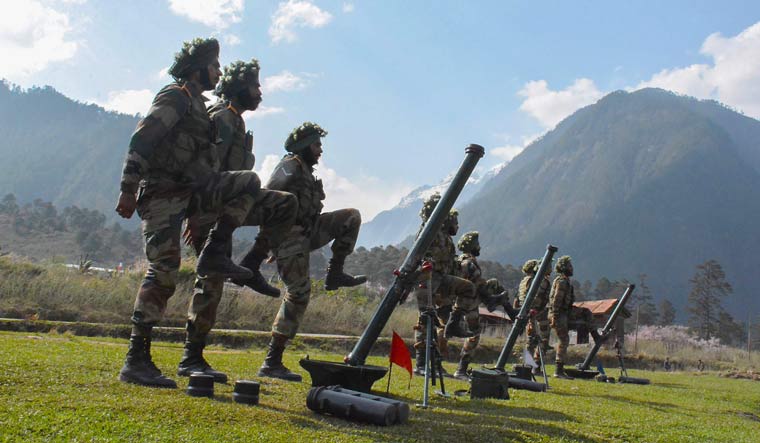‘Attempt To Politicise Indian Army A Dangerous Step’
Oct 16, 2023 | Pratirodh Bureau
A file photo shows Indian Army personnel carrying out drills at Kibithu, close to the Line of Actual Control in Anjaw district of Arunachal Pradesh (Photo: PTI)
On Monday, the Congress said the Centre was trying to make use of the Indian Army to carry out its publicity; this was a very dangerous step and the opposition party urged President Droupadi Murmu to direct the government to stop this immediately.
Congress General Secretary Jairam Ramesh, in a post on X, said, “Indian Army is the army of the entire country and we are proud that our brave army never became a part of the internal politics of the country.”
Ramesh said that after facing unemployment, inflation and failure on all fronts during the nine and a half years of government, the Modi government is now trying to make a very poor attempt to get its political publicity from the Indian Army. The Rajya Sabha MP said, “This attempt to politicize the army is a very dangerous step.”
Ramesh added, “We request President Draupadi Murmu ji, the Supreme Commander of the Indian Armed Forces, to intervene in this matter and direct the Modi government to immediately withdraw this wrong step.”
Attaching a news report along with his tweet, Ramesh said the Army was being asked to promote the schemes of the government.
With this step, the Congress, which has been critical of the government over its OROP, Agnipath scheme and recent disability pension scheme, has got fresh ammo to target the Central government.
Meanwhile, writing in The Hindu in April 2019, Mohammed Ayoob, University Distinguished Professor Emeritus of International Relations, Michigan State University and Non-Resident Senior Fellow, Center for Global Policy, Washington, DC had said:
“In a letter dated April 11, more than 150 senior military veterans, including several former service chiefs, wrote to the President expressing their anguish over the ‘politicisation’ of the military. They requested him “to take all necessary steps to urgently direct all political parties that they must forthwith desist from using the military, military uniforms or symbols, and any actions by military formations or personnel, for political purposes or to further their political agendas”. Furthermore, they castigated political leaders for taking credit for military operations such as cross-border strikes, terming it a “totally unacceptable practice”. The senior veterans singled out Uttar Pradesh Chief Minister Yogi Adityanath’s statement calling the military “Modi ki sena” for special condemnation.”
Ayoob said further, “Using military achievements for electoral gains is dangerous. Even then-Prime Minister Indira Gandhi desisted from going down this route after the 1971 war. She did not take excessive credit for that victory despite the fact that her and her advisers’ astute political and diplomatic strategies contributed profoundly in creating an international environment that made the victory possible. The current political atmosphere is already vitiated by the use of communally polarising tactics, including the juxtaposition by Mr. Adityanath of ‘Ali’ with ‘Bajrang Bali’. Exploiting India’s military, so far a remarkably politically neutral force, for partisan ends adds to the already morally degraded political environment in which the elections are taking place.”
Ayoob added, “The use of the armed forces as a political tool is just one side of the coin. Even more dangerous is the fact that it sends the signal to the top brass that there is nothing wrong in intermixing politics with the military. The eventual lesson they will learn is that they can interfere in the political process with impunity since the civilian leadership has already legitimised the military’s use in the political realm. In recent years, many senior serving officers have commented on important domestic and international issues, such as immigration and India-Pakistan relations, that until recently had been off limits for the military brass. This is an unprecedented development that needs to be reversed in order to preserve civilian supremacy over the armed forces and keep the political and military arenas distinct. These two trends — the use of the military for short-term political gains and the propensity of serving officers to make politically charged statements — augment each other. This nexus does not bode well for Indian democracy.”
